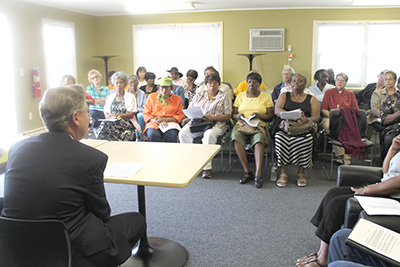
Recalling how Schroeck turned the football squad around
August 15, 2014
Circus coming to Oceanport
August 16, 2014By Neil Schulman
Long Branch — About 15-20 people in Long Branch, and hundreds of thousands nationwide, will be affected by new laws on rent requirements for affordable housing.
Under the new guidelines, the Long Branch Housing Authority, and all similar organizations around the country, are now required to charge at least 80 percent of the fair market value in rent, or 30 percent of a person’s income.
Before the new guidelines for the Department of Housing and Urban Development (HUD) were passed, housing authorities had discretion on what percentage of the fair market share they charged.
On Monday, at a meeting in Hobart Manor, Congressman Frank Pallone and Housing Authority officials explained how the new laws had come about, and suggested residents contact national organizations to work to change them.
Pallone said this new law came about due to the policial situation in Washington, particularly because of “the Republican majority in the House,” many of who have a philosophical opposition to government assistance.
“They want to cut back, in real terms, on the HUD budget,” Pallone said. As part of that, they’ve introduced new requirements on what must be charged for affordable housing; in the past, a group like the Long Branch Housing Authority could charge less than the 80 percent. That’s no longer the case.
“It is mandated by law, a law I don’t like,” Pallone said. “The (Long Branch) Housing Authority doesn’t have the option of charging less.”
For a one bedroom at Hobart Manor, 80 percent of the fair market rent is estimated to cost $816 a month, which Pallone pointed out is almost $10,000 a year. For many on a fixed income, that’s not an option.
The U.S. Social Security Adminstration estimates the average payment to retired workers is just under $1,300 a month.
“The only alternative to that is the 30 percent of your income,” Pallone said.
For most of the residents in units under the control of the Long Branch Housing Authority, the law won’t have a major effect because they are paying based on their income.
Attendees from several of the developments in the authority filled the meeting room, voicing questions and concerns.
“How are we going to settle this matter?” one woman asked. “We have retirement. We are sick. We have other bills. We won’t even have money to buy food.”
Others said they thought that the method the Long Branch Housing Authority was using to come up with their numbers for rent was incorrect, asking them to recalculate the formulas.
The Housing Authority says that the fair market rent is determined by looking at rates around the city, not just at specific locations. That means, for example, Hobart Manor’s rates are not affected by the fact that it is only a few blocks from the ocean, where rents are often higher than inland.
Daniel Gibson, Chief of Staff of the Long Branch Housing Authority, said the changes would only affect about 15-20 city residents. However, the issues has been a large concern; the meeting Pallone attended was the third the Authority had held to discuss the changes.
He also noted that the minor impact in Long Branch would be felt heavily in other cities around the nation.
“In New York City, there are approximately 24,000 … who are affected,” Gibson noted. Jersey City and Newark also appear to be strongly impacted by this, he noted.
Pallone said that in recent years, older affordable housing units around the country had been demolished, diminishing the supply. When the recession hit in 2009, demand rose sharply for the reduced amount of housing, creating a problem.
Pallone said the usual way he encourages his constituents to lobby for change – contacting their local representatives – won’t help in this case. He opposes what the House has done, as do New Jersey Senators Robert Menendez and Corey Booker.
“I would never discourage anyone from doing letters, doing petitions,” he said. “But we agree with you.”
He said the Republican Congressmen who voted for it were often hurting their own constituents, since many of them represented states with much higher poverty levels than New Jersey.
He said he believed that repealing the law would depend on the results of upcoming elections.
Instead of contacting local representatives, he recommended local groups work with national groups, lobbying for change around Washington.
“Get other people involved, so it isn’t just Long Branch,” he said.
Gibson said the Long Branch Housing Authority was already doing that, working with a nationwide organizations of authority administrators to lobby for change in Washington.






